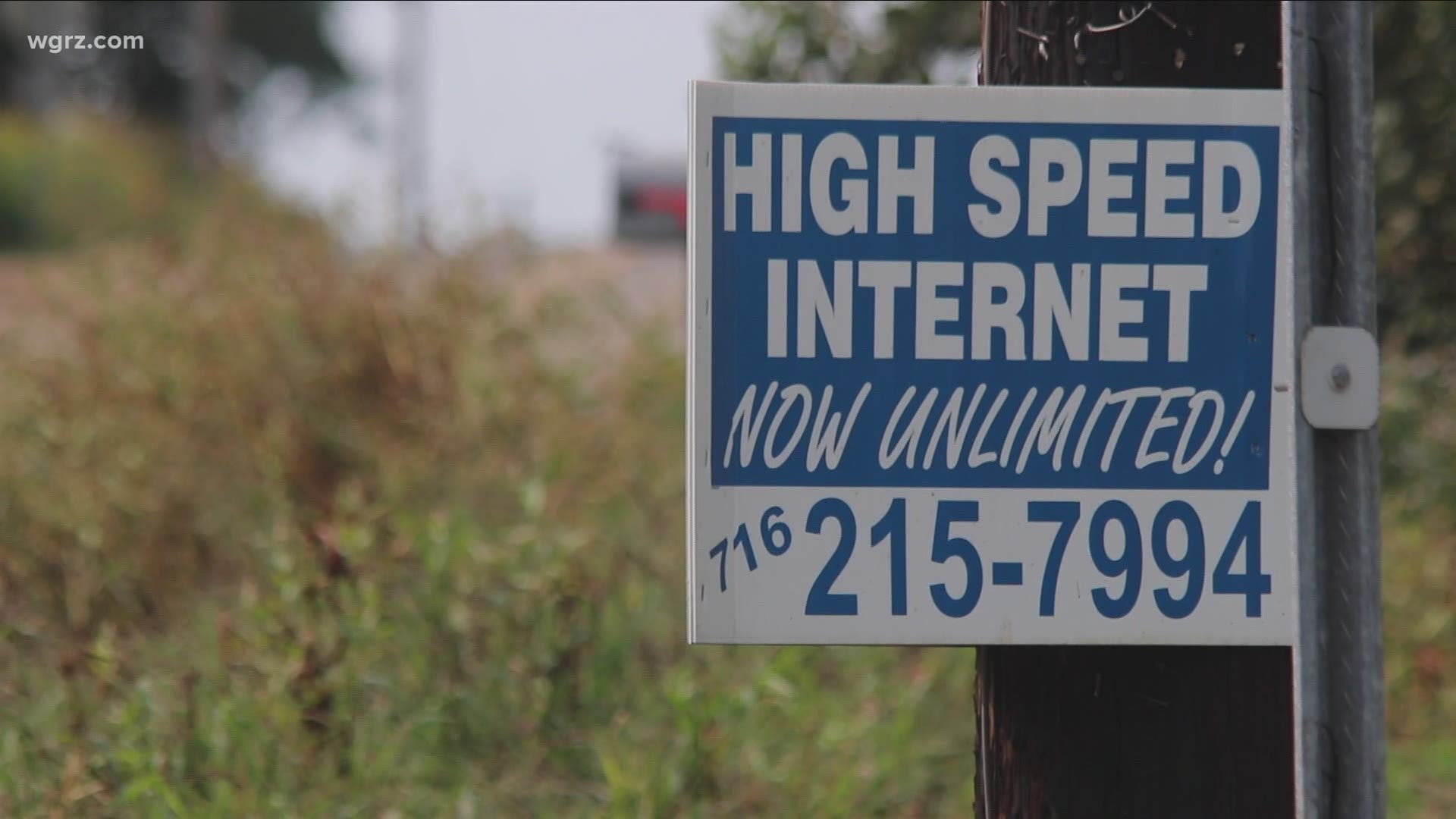WHEATFIELD, N.Y. — During the summer, new public Wi-Fi hot spots were installed at the Wheatfield town hall and another dozen municipal buildings in Niagara and Orleans counties.
Niagara and Orleans counties were mostly ignored by the New York State Broadband Program, according to Ortt, and an analysis of the data available on the state broadband program website.
It was at the town hall that Senator Rob Ortt (R), who was joined by Niagara County legislator David Godfrey (R) and Orleans County Chairperson Lynne Johnson (R), where he continued his call for the so-called broadband tax to be repealed.
Ortt says the tax punished rural communities who are seeking to expand broadband coverage.
"It was an increased tax for people who wanted to bring rural broadband during the approval process," Ortt said at the news conference.
The tax is actually an addition to the consolidated highway law of New York and it reads as follows:
"The commissioner of transportation is hereby authorized to enter into an agreement with any fiber optic utility for use and occupancy of the state right of way for the purposes of installing, modifying, relocating, repairing, operating, or maintaining fiber optic facilities. Such agreement may include a fee for use and occupancy of the right of way, provided, however, such fee shall not be greater than fair market value. Any provider using or occupying a right of way in fulfillment of a state grant award through the New NY Broadband Program shall not be subject to a fee for such use or occupancy. Any fee for use or occupancy charged to a fiber optic utility shall not be passed through in whole or in part as a fee, charge, increased service cost, or by any other means by a fiber optic utility to any person or entity that contracts with such fiber-optic utility for service. Any compensation received by the state pursuant to such agreement shall be deposited by the comptroller into the special obligation reserve and payment account of the dedicated highway and bridge trust fund established pursuant to section eighty-nine-b of the state finance law. Nothing herein shall impair, inhibit, or otherwise affect the ability of any municipality to regulate zoning, land use, or any other power or authority granted under the law. For purposes of this subdivision, "municipality" shall include a county, city, village, or town."
Basically, the addition to the highway law allows the Department of Transportation to add fees to permits and any expanded broadband infrastructure projects.
"I can't think of a more out of touch, obtuse tax," Ortt said. "And there's a lot of them, but this one really is galling to me."
Ortt says he's not sure how many projects the tax has stalled, citing service providers will often just say they're moving on to something else, but he's certain projects are being delayed or outright canceled.
"Either they're not going to do it, or they're going to say we're just gonna build-out to fewer homes to absorb the fee because we can't pass it on directly," Ortt said.
Orleans County Chairperson Lynne Johnson says the tax hasn't canceled a proposed broadband project that could connect the majority of the county, but the developer is contemplating scaling down the project because of inflated costs.
"They figure this fee will cost $25 per home if it were to be allowed to be passed on to the subscriber, but it's not," Johnson said.
One of the issues with rural broadband is the density of homes. Service providers have often said they need density in order to affordably roll out broadband infrastructure.
"We are very rural, we're an agricultural County," Johnson said. "You can't five homes on some of these roads in a football field length, it just isn't the way that our roads are.
Johnson cited a phone call she received from a mother of two while en route to the press conference. According to Johnson, the woman said Spectrum wouldn't build out to her house, which was approximately 1,000 from a home that had Spectrum internet.
Ortt, Johnson, and Godfrey have been working on this issue of rural connectivity for nearly a decade.
"I hear from constituents every day on this issue," Ortt said.
Legislator Godfrey says the disparity between state data and other third parties from data is frustrating. On one hand, the state says 98% of the state is covered, but Microsoft data suggests 9 million New Yorkers aren't using the internet at broadband speeds, and roughly 126,000 in Niagara County aren't using the internet at broadband speeds.
"The digital divide needs to be closed, and we're here to make sure it's closed as quickly as possible," Godfrey said.

